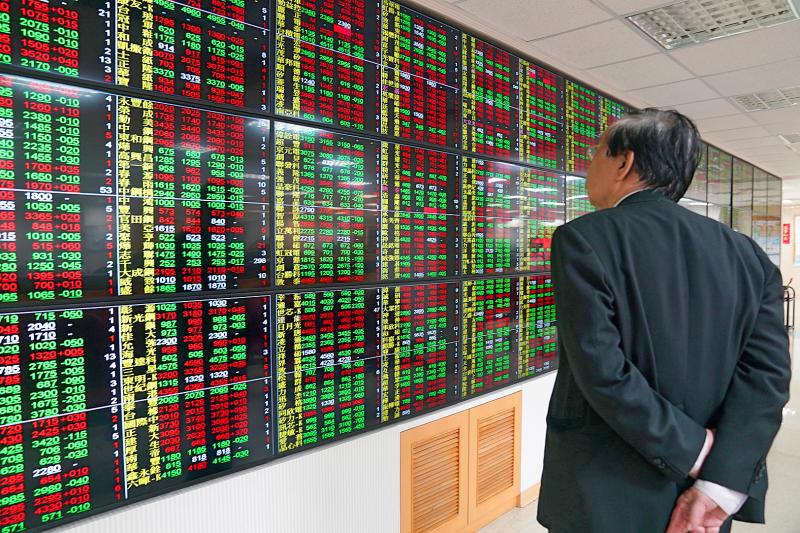The Taiwan Stock Exchange (TWSE) yesterday commenced intraday odd-lot trading, recording 46,164 transactions worth NT$363 million (US$12.56 million), accounting for 0.22 percent of the TAIEX’s total turnover, exchange data showed.
Odd-lot trading enables investors to purchase any number of shares between one and 999, lower than the standard unit of trading, or 1,000 shares, thus lowering the threshold at which small investors can buy high-priced stocks.
Odd-lot traders yesterday bought a total of 4.31 million shares, or 94 shares per transaction on average, the data showed.

Photo: CNA
Taiwan Semiconductor Manufacturing Co (TSMC, 台積電) shares were most favored by odd-lot traders, with 266,041 shares traded through the newly launched trading pool, the data showed.
TSMC was followed by E.Sun Financial Holding Co (玉山金控) with 208,322 shares traded, FocalTech Systems Co (敦泰電子) with 170,140 shares traded and Evergreen Marine Corp (長榮海運) with 163,028 shares traded, the data showed.
A Yuanta Securities Investment Trust Co (元大投信) exchange-traded fund (ETF), known as “Yuanta Taiwan High Dividend,” came in fifth, with 144,604 shares traded, the data showed.
“It was no surprise that TSMC was popular among odd-lot traders,” TWSE trading division director Ben Chen (陳正斌) told the Taipei Times by telephone.
“Given that the firm’s share price has been hovering around NT$450 recently, many investors used to feel interested in the stock, but could not afford it, as they did not have NT$450,000 [for a standard unit of 1,000 shares]. Now, they can buy TSMC’s odd-lot shares for just several thousands of New Taiwan dollars,” Chen said.
TSMC’s 266,041 shares traded in the odd-lot trading mechanism were still much lower than the 14,958 units, or 14.95 million shares, that changed hands in regular trading yesterday, the data showed.
Shares of E.Sun Financial, Evergreen Marine and FocalTech are not pricey, and investors are interested in them due to their rosy business outlook or stable dividend payouts, Chen said.
Odd-lot investors favoring the Yuanta ETF could be attracted by the firm’s announcement earlier this month of a cash dividend of NT$1.6, he said.
Overall, the launch of the odd-lot intraday trading did not boost the TAIEX’s turnover considerably, as many investors still stayed on the sidelines, Chen said.
However, as the odd-lot intraday transaction of NT$363 million was more than double the NT$154 million made through odd-lot trades made in after-hours yesterday, it seems there is still room to attract new investors, he said.
The TAIEX closed slightly higher yesterday, even though the large-cap tech stocks that usually drive the market were mixed in reaction to the weak third-quarter results for Intel Corp’s data center group, dealers said.
Select old economy and financial stocks benefited from rotational buying, but turnover remained moderate amid caution ahead of the US presidential election, they said.
The TAIEX ended up 10.21 points, or 0.08 percent, at 12,909.03, with turnover of NT$163.562 billion. Foreign institutional investors sold a net NT$1.46 billion of shares on the main board, the data showed.
Additional reporting by CNA

To many, Tatu City on the outskirts of Nairobi looks like a success. The first city entirely built by a private company to be operational in east Africa, with about 25,000 people living and working there, it accounts for about two-thirds of all foreign investment in Kenya. Its low-tax status has attracted more than 100 businesses including Heineken, coffee brand Dormans, and the biggest call-center and cold-chain transport firms in the region. However, to some local politicians, Tatu City has looked more like a target for extortion. A parade of governors have demanded land worth millions of dollars in exchange

An Indonesian animated movie is smashing regional box office records and could be set for wider success as it prepares to open beyond the Southeast Asian archipelago’s silver screens. Jumbo — a film based on the adventures of main character, Don, a large orphaned Indonesian boy facing bullying at school — last month became the highest-grossing Southeast Asian animated film, raking in more than US$8 million. Released at the end of March to coincide with the Eid holidays after the Islamic fasting month of Ramadan, the movie has hit 8 million ticket sales, the third-highest in Indonesian cinema history, Film

Taiwan Semiconductor Manufacturing Co’s (TSMC, 台積電) revenue jumped 48 percent last month, underscoring how electronics firms scrambled to acquire essential components before global tariffs took effect. The main chipmaker for Apple Inc and Nvidia Corp reported monthly sales of NT$349.6 billion (US$11.6 billion). That compares with the average analysts’ estimate for a 38 percent rise in second-quarter revenue. US President Donald Trump’s trade war is prompting economists to retool GDP forecasts worldwide, casting doubt over the outlook for everything from iPhone demand to computing and datacenter construction. However, TSMC — a barometer for global tech spending given its central role in the

Alchip Technologies Ltd (世芯), an application-specific integrated circuit (ASIC) designer specializing in server chips, expects revenue to decline this year due to sagging demand for 5-nanometer artificial intelligence (AI) chips from a North America-based major customer, a company executive said yesterday. That would be the first contraction in revenue for Alchip as it has been enjoying strong revenue growth over the past few years, benefiting from cloud-service providers’ moves to reduce dependence on Nvidia Corp’s expensive AI chips by building their own AI accelerator by outsourcing chip design. The 5-nanometer chip was supposed to be a new growth engine as the lifecycle